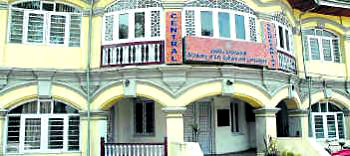 Jammu and Kashmir Academy of Art, Culture and Languages is a cultural institution. This was a cultural institution as promised by the new constitution of the state of Jammu and Kashmir approved on 17 November 1956. Besides initiating a number of projects on the systematic study and development of Kashmiri and other regional languages of the state, the Academy provided all manner of facilities for the augmentation of theatrical activities across the state. It sponsored annual drama festivals at which all the professional folk-theatre troupes, specially the Kashmir Bhagat Theatre or Akingam, and the newly emerged amateur groups like the Rangmanch Theatre, Kashmir Valley Theatre, Nav Rang Club, and Kalidasa Dramatic Club, presented valuable work. It also held annual playwriting competitions, most of the award-winning scripts being published with the Academy`s financial assistance.
Jammu and Kashmir Academy of Art, Culture and Languages is a cultural institution. This was a cultural institution as promised by the new constitution of the state of Jammu and Kashmir approved on 17 November 1956. Besides initiating a number of projects on the systematic study and development of Kashmiri and other regional languages of the state, the Academy provided all manner of facilities for the augmentation of theatrical activities across the state. It sponsored annual drama festivals at which all the professional folk-theatre troupes, specially the Kashmir Bhagat Theatre or Akingam, and the newly emerged amateur groups like the Rangmanch Theatre, Kashmir Valley Theatre, Nav Rang Club, and Kalidasa Dramatic Club, presented valuable work. It also held annual playwriting competitions, most of the award-winning scripts being published with the Academy`s financial assistance.
The most significant event in the development of modern Kashmiri theatre was the construction of Tagore Hall in the heart of Srinagar. The Academy efficiently managed it, organizing festivals there as well as shows by independent groups. Since Tagore Hall`s establishment in 1960, it became the centre of variegated cultural activities until it was partially destroyed in an explosion in 1990. The hall was equipped with modern technology, which made it possible to stage such memorable plays and operas as Dina Nath Nadim`s Vitasta, Pushkar Bhan`s Machami, Gyandev Agnihotri`s Shuturmurg i.e. `Ostrich`, Pran Kishore`s Gatireny i.e. `Dancing Girl`, Bansi Nirdosh`s Bas akh tamah i.e. `Just One Desire`, Ghulam Rasool Santosh`s Akanandun, Zubir Rizvi`s Tipu Sultan, Moti Lai Kemmu`s Tshay and Trunove, Mohammad Subhan Bhagat`s Taqdir and various Pethirs, and Hari Krishan Kaul`s Natuk keriv band.
The Abhinava Theatre in Jammu was built in 1978. This is affiliated to the Academy and is now an important centre of theatrical performances. This well-furnished hall, accommodating 500 spectators, combines several new concepts of a functional theatre.




